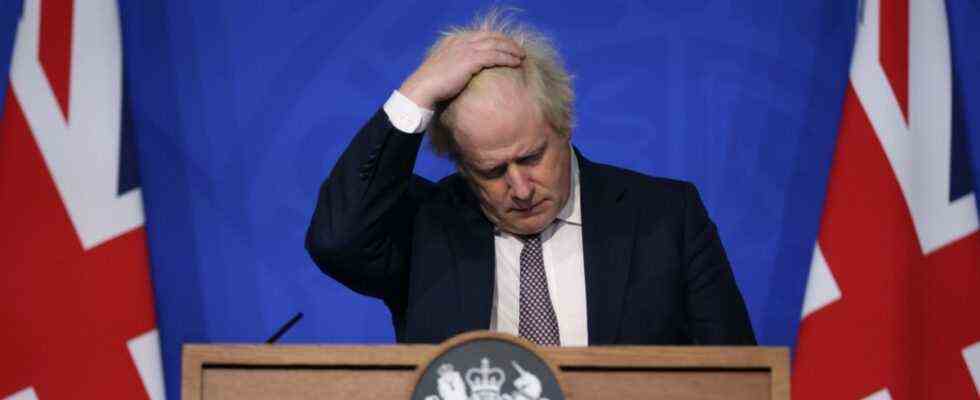The evening was already advanced when Keir Starmer stood in front of a Christmas tree and had to put the disaster into words. Keir Starmer is the head of the British Labor Party, he is the opposition leader in the House of Commons, opposition leaders are always welcome interlocutors for television at such moments, because of the catchy words that can be expected. And the evening was not as bad for Boris Johnson as feared during the day, but worse.
That evening, said Starmer, was “a hard blow” for Johnson. In English, that actually sounds handy: “A significant blow.” So that every TV viewer could remember this, he repeated the words in the next sentence.
In four votes on Tuesday evening, the British Parliament passed new measures in the fight against the spread of the Omikron variant, not particularly strict from a German 2-G perspective. But the resistance in parliament was greater than ever before in Johnson’s tenure as prime minister. It was a “cry of pain” from the Conservative Party, Tory MP Charles Walker scowled into the BBC camera when it was over.
Walker is an experienced MP, one of the quite a few in the House of Commons who can speak a little more succinctly than Keir Starmer – and one of those who are obviously particularly angry with Johnson at the moment. Boris Johnson is now in a “very, very, very difficult position” and a “very, very clear line has been drawn in the sand,” said Walker. The Prime Minister and his team should “listen carefully” now.
Almost 60,000 newly infected people in one day – more than since January
Walker is also vice chairman of the 1922 committee, that powerful alliance of the Tory backbenchers who have been harshly criticizing Johnson for weeks. Johnson had visited the committee at its premises in Westminster at about half past five, about an hour before the start of the voting, in order to save what could no longer be saved. The prime minister spoke in a very serious voice appropriate to the occasion, reported the reporters who had been waiting outside the door later. It was useless.
The story of that evening is now also a story of numbers. The Omikron variant is currently causing a worrying increase in the number of corona cases, officially 59 610 newly infected people were counted on Tuesday, more than since January. The government therefore vehemently campaigned for the four new measures in the more than four-hour debate: mask requirement in closed rooms, except in pubs and restaurants, rapid tests instead of self-isolation after contact with those who tested positive, a Covid pass for attending larger events and compulsory vaccination for the staff of the national health service NHS.
In particular, the Covid pass, in which either proof of vaccination or a negative test result should be noted, caused a lot of excitement among the conservatives. During the day it was said that up to 77 Tory MPs could vote against the Covid pass. 77, that would have been tough – Johnson’s operational majority is 79 seats now, and that many votes against from within are rare when the Prime Minister has such a comfortable majority as Johnson.
369 to 126, that is the official result of the vote, with which the new Covid pass was then decided. Of the 126 votes against, 98 were Tory MPs.
Nearly 100 Tory MPs oppose Johnson Corona plans
The mask requirement was resolved by 441 to 41, 40 votes against came from the conservatives. The vote on compulsory vaccination for NHS employees ended 385 to 100, and the number of all votes against would have been a little higher had it not been for a double-digit number of MPs missing because of a positive corona test. Johnson was only able to implement all four measures with the help of the opposition. Labor would not vote on party politics, Starmer had already said during the day, but for the measures “because they are necessary”.
If Johnson doesn’t change, the question of a change in leadership will have to “be on the table” next year, said Geoffrey Clifton-Brown, one of the Tory MPs on the 1922 committee. Among those who voted against the measures, however, were not only Tories from the extremely conservative to right-wing, but Tories of all backgrounds and ages. “The prime minister is now in serious trouble,” said Daisy Cooper, a Liberal Democrat MP.
Many Tories probably wanted to send a signal with their no to the measures, as a precautionary measure: The fire accelerator Omikron could ensure further lockdowns, and that is exactly what some conservatives want to prevent at all costs. For Johnson, governing as a pandemic crisis manager will not be any easier, especially since he is unlikely to be rid of his second role as a party crisis manager anytime soon.
By Friday at the latest, Cabinet Secretary Simon Case plans to publish the results of his investigation into banned parties for Christmas 2020 in Downing Street. The Wednesday edition of the Daily Mirror with an “extraordinary” photo, as the paper wrote, on the front page. To see are therefore: 24 people at a party in the lockdown winter 2020, some hold a wine glass in the camera. All 24, it was said, were advisors and members of the Tories.

